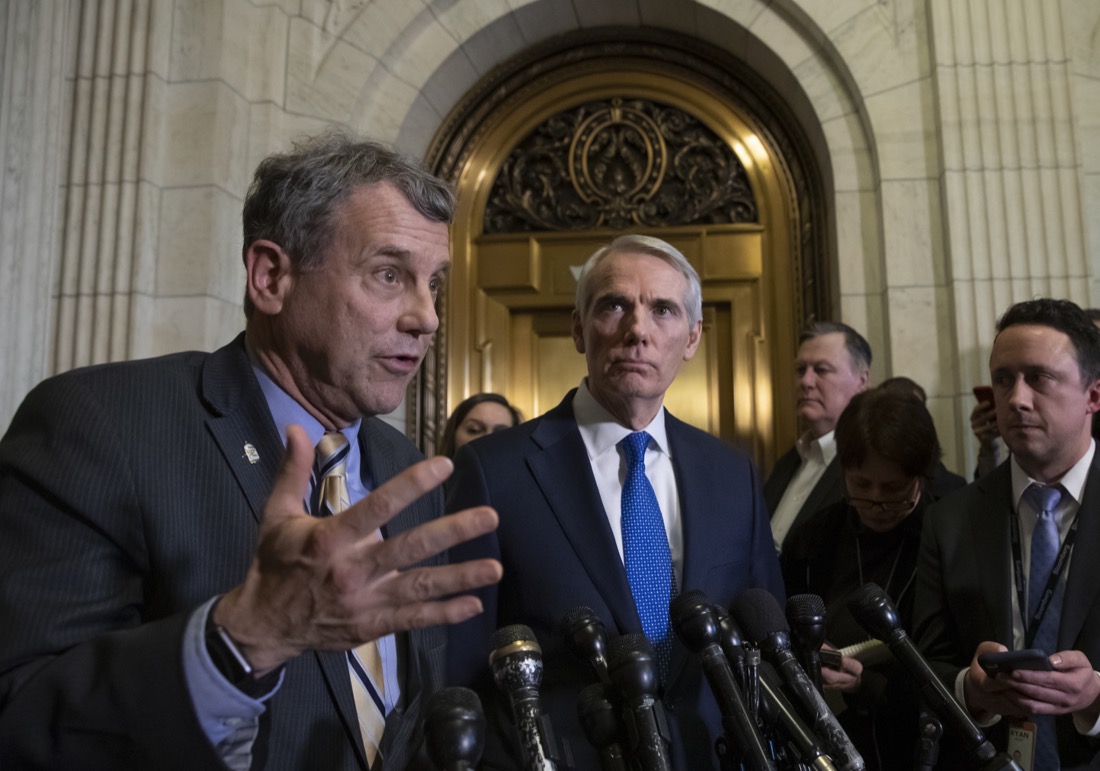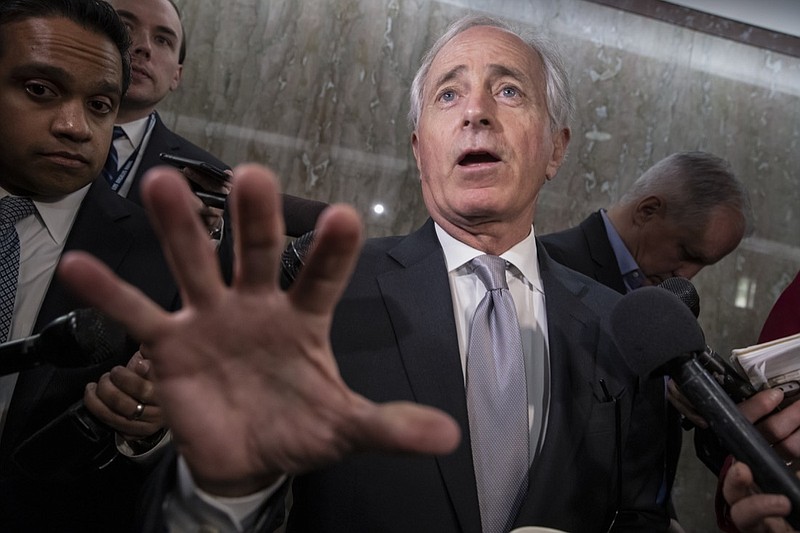NASHVILLE -- U.S. Senate Foreign Relations Committee Chairman Bob Corker, R-Tenn., said Friday that a colleague, Sen. Rob Portman, R-Ohio, will now lead congressional efforts to end modern slavery across the globe after the Chattanoogan leaves office next week.
"For years, Senator Portman has been a champion in Congress in the fight against human trafficking here at home, and I can think of no one better to take up the mantle in the global fight against this scourge on humanity as I depart the Senate," Corker stated Friday in a news release. "With passage of the End Modern Slavery Initiative Act and launch of the Global Fund to End Modern Slavery, we have made great progress in this fight, but much more work remains."
 Sen. Sherrod Brown, D-Ohio, left, and Sen. Rob Portman, R-Ohio, speak to reporters after a meeting with General Motors CEO Mary Barra to discuss GM's announcement it would stop making the Chevy Cruze at its Lordstown, Ohio, plant, part of a massive restructuring for the Detroit-based automaker, on Capitol Hill in Washington, Wednesday, Dec. 5, 2018. (AP Photo/J. Scott Applewhite)
Sen. Sherrod Brown, D-Ohio, left, and Sen. Rob Portman, R-Ohio, speak to reporters after a meeting with General Motors CEO Mary Barra to discuss GM's announcement it would stop making the Chevy Cruze at its Lordstown, Ohio, plant, part of a massive restructuring for the Detroit-based automaker, on Capitol Hill in Washington, Wednesday, Dec. 5, 2018. (AP Photo/J. Scott Applewhite)Emphasizing that he plans "to continue to play a role in this fight as a private citizen, I am incredibly grateful that Rob has agreed to take the helm in Congress to ensure this important work continues as we strive to end modern slavery once and for all."
Portman said he feels "honored" that Corker "entrusted me with this role and I want to thank him for his tireless and courageous efforts to combat this horrific crime around the globe. Over the past decade we have made progress but there is much more to do both in the U.S. and in other countries to help end this scourge once and for all."
More than 27 million people are enslaved around the world, which, according to Corker, is more than at any time in history.
He says that while the U.S. government agencies and non-profit have taken "significant steps to end this scourge on humanity, much more work remains."
After recognizing the U.S. couldn't meet challenges alone, Corker three years ago proposed his bipartisan initiative to end modern slavery and human trafficking worldwide.
The End Modern Slavery Initiative Act was designed to leverage limited foreign aid dollars and galvanize support and investment from the public sector, philanthropic organizations and the private sector to focus resources where the crime is most prevalent.
With broad support from individuals, organizations, and faith-based institutions, congressional authorization for the initiative was included in the National Defense Authorization Act of 2017, which overwhelmingly passed the Senate two years ago and signed into law by the president.
Passage led to the creation of the Global Fund to End Modern Slavery (GFEMS), a non-profit, grant-making foundation in the District of Columbia that funds programs and projects outside the U.S.
According to Corker's office, these will contribute to the freeing and sustainable recovery of victims of modern slavery, help prevent others from being enslaved and boost enforcement of laws to punish individual and corporate perpetrators of modern slavery.
Efforts seek to achieve a measurable 50 percent reduction of modern slavery in the areas where the foundation operates.
The foundation hopes to raise $1.5 billion over the next decade, more than 80 percent of which will come through matching funds from the private sector and foreign governments.
To date, more than $105 million has been contributed to the fund. That includes $46 million from the U.S. State Department, $25 million from the United Kingdom, $25 million from a private donor and $11.6 million from Norway.
As a senator, Portman has authored six federal anti-trafficking laws designed to better serve victims and help law enforcement. That includes the Stop Enabling Sex Traffickers Act (SESTA), which President Donald Trump signed earlier this year.
It is intended to help curb the explosion of online sex trafficking and give victims the tools necessary to hold accountable websites that knowingly facilitate the trafficking of women and children online.
